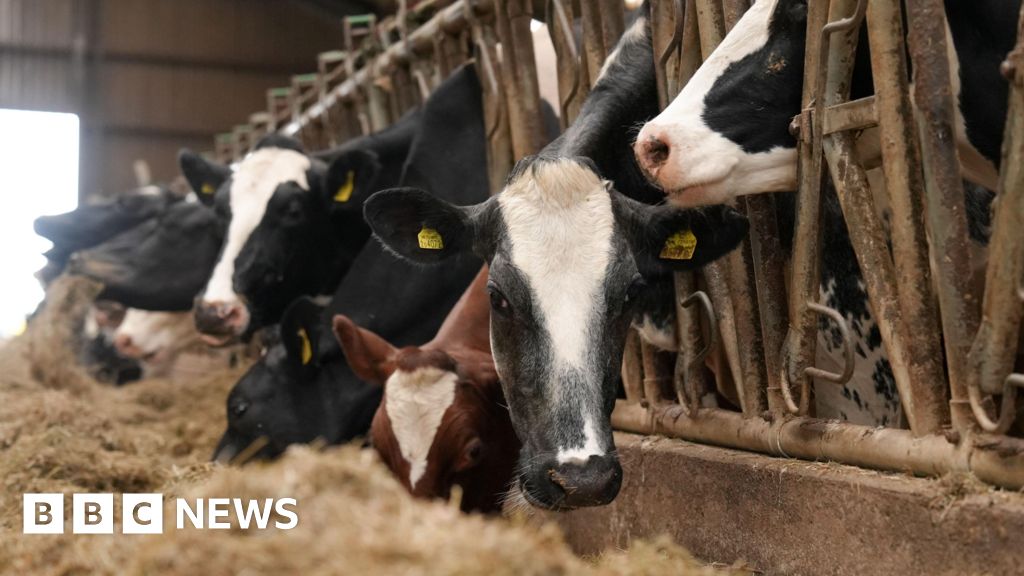Restrictions brought in to try to prevent the bluetongue virus spreading to livestock in Wales are futile and impractical, farming unions have said. From 1 July, all cattle, sheep and goatsbeing transported across the border from Englandwill need to test negative for the disease before they can be moved into Wales. While bluetongue has spread across large parts of England, it has yet to reach Wales this year and the Welsh government said its policy was aimed at holding the virus back "for as long as we can". Spread by midges, bluetongue presents no threat to food safety or human health, but can be fatal for livestock, including sheep and cattle. At the Monmouthshire livestock market, near Raglan, there was plenty of livestock for sale, butmany farmers were worried. A restricted zone (RZ) in England - limiting the movement of animals - hascontinued to expand over recent monthsas the disease has spread. The UK government has now decided to designate the whole of England as an RZ from 1 July, meaning an end to movement controls within England, prompting the Welsh government's response. The restrictions, announced by Wales' Rural Affairs Secretary Huw Irranca-Davies, will see farmers have to obtain and pay for pre-movements tests and licenses for animals being moved from England to Wales. Monmouthshire market's manager, Phil Jones, said the restrictions would leave the market in "dire straits". "It's going to be devastating to us, and a lot of the farmers and every livestock market right through the Welsh and English border as well. "For us it's going to knock around 20% out of the business that we do… If these restrictions are in place come breeding sale season in late July, August, and through September then we'll be in dire straits." Abi Reader from the National Farmers' Union was vaccinating her cattle against bluetongue at her farm in the Vale of Glamorgan. There is a vaccine for cows, although it takes weeks to be effective. Ms Reader said: "We need to see a better rollout of the vaccine, and we need better messaging going to farmers to say it's worthwhile, but we also need to think of more pragmatic things that we can do up and down that border to help farmers to be able to trade. "Ultimately we need to get to a place where animals can be traded." The Farmers' Union of Wales said trying to enforce a border was futile and impractical, and trade would be badly disrupted, while the National Farmers' Union said the restrictions were not proportionate to the risk from bluetongue. Opposition parties have also criticised the Welsh government's strategy. The Conservatives have said ministers should have looked into the economic impact of their decision, while Plaid Cymru wants ministers to promote vaccination and ensure there was enough of it available. However the minister in charge, the Rural Affairs Secretary, Huw Irranca-Davies MS, said it was the right thing to do. "Our approach now, is to do our darnedest to keep bluetongue out of Wales," he said. "We're trying to do this to actually buy farmers time as well… But let me be clear, if bluetongue does spread, and if it spreads more rapidly than we anticipate, we can change very quickly and dynamically."
Deadly livestock virus restrictions 'futile' say farmers
TruthLens AI Suggested Headline:
"Farmers Criticize Welsh Bluetongue Virus Restrictions as Impractical"
TruthLens AI Summary
Farmers in Wales are expressing significant concerns regarding the recent restrictions imposed to prevent the spread of the bluetongue virus among livestock. Starting from July 1, all cattle, sheep, and goats being transported from England to Wales must test negative for the bluetongue virus, a disease that, while not harmful to human health or food safety, can be fatal for affected livestock. The Welsh government aims to delay the virus's entry into Wales, as it has already spread across many regions of England. However, farmers argue that these restrictions are impractical and will severely disrupt trade, particularly as the entire region of England has been designated as a restricted zone due to the ongoing spread of the disease. This decision has raised fears that the livestock market in Wales will suffer a significant downturn, with estimates suggesting a potential loss of approximately 20% in business for farmers if the restrictions remain in place during critical breeding sale seasons later in the summer and early autumn.
The National Farmers' Union and the Farmers' Union of Wales have voiced their opposition to the restrictions, labeling them as futile and disproportionate to the actual risk posed by bluetongue. Farmers are advocating for improved vaccination efforts and better communication regarding the benefits of vaccinating livestock against the disease. Phil Jones, the manager of the Monmouthshire livestock market, highlighted the dire situation farmers face, emphasizing the need for practical solutions that allow for safe trade across the border. While some opposition parties are urging the Welsh government to consider the economic ramifications of these measures and promote vaccination, Rural Affairs Secretary Huw Irranca-Davies maintains that these restrictions are necessary to protect Welsh livestock. He emphasized the importance of buying time for farmers to prepare, indicating that the government is prepared to adapt its strategy if the situation with bluetongue changes rapidly.
TruthLens AI Analysis
You need to be a member to generate the AI analysis for this article.
Log In to Generate AnalysisNot a member yet? Register for free.
